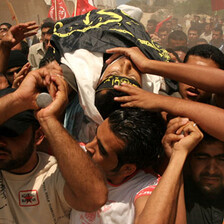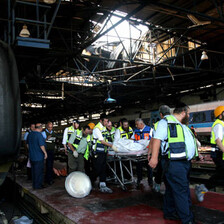Yedioth Ahronoth 11 March 2003
To the extent that the recent military acts in the territories are debated in Israel at all, the debate almost solely revolves around the question whether or not it is possible to end the Palestinian terror this way. The Palestinians, as human beings, simply do not exist.
A few days ago it snowed in Jerusalem. On Tuesday, Ferbruary 25th, the cold wave featured in all Israeli papers as the main news. Even in my heated home in Tel Aviv it was cold. My thoughts wandered to my Palestinian friends — colleagues from Bir Zeit University. How does the snow fare with a family that still has a home, but not that much money to heat it? And what’s with those who no longer have a home? It snowed in Jenin as well. How did the Jenin refugees survive the cold, and those who were recently made to flee from Hebron? And what about the old people, for whom the cold is particularly dangerous? Where did the new homeless of Gaza spend the night - those whose homes were destroyed that same day? Is UNRWA still able to provide them with blankets and tents?
At the beginning of February, the United Nations Relief and Works Agency for Palestinians in the Near East (UNRWA), renewed its emergency appeal to the international community for urgent contributions for the first half of 2003. They stated that without these contributions, which have decreased lately, their budget would end in March[1].
The heart seeks answers, but the papers tell you nothing about that. Across the fence, outside the media, outside of consciousness, the Palestinians don’t even have weather.
That same day, however, Ha’aretz reported a new campaign, launched by the Israeli security echelons, to confiscate funds that are transmitted to the Palestinians through Israeli banks - “tens of millions of dollars a year — mainly from charity organizations in the Arab countries and in Europe”. (Amos Har’el, Hebrew edition only). While UNRWA is on the verge of collapse, the Palestinians should be deprived also of the charity funds that help them survive.
This is not an isolated incident, but one more step in a systematic Israeli policy of economic strangulation. Already in June 2002, “internal conclusions of the security echelons, following operation ‘Defensive Shield’, assessed that the financial reserves of the Palestinian authority are reaching the bottom… In a future not far off, the majority of Palestinians will only be able to maintain a reasonable life through the help of international aid.” (Amos Har’el, Ha’aretz, Hebrew edition, June 23, 2002). At the same time, Israel, aided by the Jewish Lobby in the US congress, opened a campaign to restrict international aid, and demanded a “reconsideration” of UNRWA’s operations in the occupied territories:
“Israel has begun a campaign in the United States and the United Nations to urge a reconsideration of the way the UN Relief and Works Agency, which runs the Palestinian refugee camps in the West Bank and Gaza, operates. Israel charges that UNRWA workers simply ignored the fact that Palestinian organizations were turning the camps into terrorist bases and it is demanding the agency start reporting all military or terrorist actions within the camps to the UN…. Meanwhile, Jewish and pro-Israeli lobbyists in the U.S. are waging a parallel campaign … American Jewish lobbyists are basing their efforts on the fact that the U.S. currently contributes some 30 percent of UNRWA’s $400 million a year budget, and is therefore in a position to influence the agency: A congressional refusal to approve UNRWA’s funding could seriously disrupt its operations.” (Nathan Guttman, Ha’aretz, June 29, 2002).
Malnutrition of Palestinian children in the occupied territories already equals that of Congo and Zimbabwe [2], but Israel “launches a campaign” to prevent even the little left to keep them nourished.
Genocide is associated in our minds with mass graves, or convoys of population transfer. The slow death inflicted on the Palestinian people has, perhaps, no name yet, but still, how does it happen that the Israeli society seals its heart and its eyes from seeing it? Part of the answer is that evil is wrapped in words about “war against terror”. The security sources announce that UNRWA “ignores” terrorist activities (as if UNRWA is a police force), or that the charity funds to the Palestinians are “millions of dollars to terror” and the media just circulates their prophecy. No further proof is ever needed.
Following the confiscation of charity funds, which started in East Jerusalem banks, “the region commander, Levi, refused to disclose precise details concerning the terrorist activities in Jerusalem that were funded with these [confiscated] funds” (Arnon Regular and Amos Har’el, Ha’aretz, February 28, 2003). The primal Israeli instinct to believe that the IDF (army) never lies will do the rest.
Israel’s persecution of the Palestinian people is not war against terror. The Palestinian suicidal terror has a simple solution — get out of the territories and give the Palestinians reasons to live. The war against the Palestinians is over the ‘Promised Land’ of Sharon, the army and the settlers. In this kind of war, one needs to lie constantly, because (according to the polls) most Israelis don’t care about the territories and they are willing to get out of there tomorrow.
Left to themselves, people won’t seek out ways to starve, torture and abandon in the cold millions of other people. To get them to accept that, one has to cultivate their fears. In the same way, the half of the American people that supports the war on Iraq believes that if they don’t immediately eliminate the Iraqi people, Saddam Hussein will eliminate the US.
Endnotes
[1] The text of the UNRWA Emergency Appeal for 2003 can be found at http://www.un.org/unrwa/emergency/pdf/5th-appeal.pdf
[2] Chris McGreal, The Guardian, 11 February 2003.
Tanya Reinhart is a professor of linguistics at Tel Aviv University, and among the Israeli signers on the British boycott petition. She is the author of ‘Detruire La Palestine - ou comment terminer la guerre de 1948’, La Fabrique 2002; Israel/Palestine- How to end the war of 1948, Seven Stories, NY, 2002. The article above first appeared in Yediot Aharonot on 9 March 2003.





